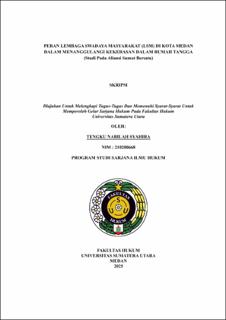| dc.description.abstract | Domestic Violence (DV) in Indonesia, particularly in Medan City, continues
to show a significant increase from year to year, as reflected in the data from the
National Commission on Komnas Perempuan and the SIMFONI PPA. Although
there are legal frameworks such as UU No. 23 Tahun 2004 concerning the
Elimination of Domestic Violence and the Sexual Violence Crime Law (UU TPKS),
its implementation still faces complex challenges, including patriarchal culture, the
economic dependency of victims, slow bureaucracy, and low public awareness to
report incidents. The role of NGOs such as the Aliansi Sumut Bersatu (ASB) is
expected to play a critical role in addressing DV through victim assistance, legal
advocacy, and community education.
The type of research used in this study is empirical legal research. The types
of data collected are divided into two types: primary data and secondary data,
gathered through interviews and documentation, which are then analyzed
qualitatively.
Research findings indicate that the development of domestic violence laws
in Indonesia, particularly since the enactment of the Domestic Violence Law (UU
PKDRT) in 2004, has provided a strong foundation for victim protection by shifting
the paradigm of domestic violence from a private issue to a human rights violation.
In Medan City, NGOs such as the Aliansi Sumut Bersatu (ASB) play an active role
in addressing domestic violence through victim assistance, policy advocacy, and
raising public awareness. However, challenges such as budget constraints, slow
bureaucracy, patriarchal culture, and victims' economic dependence still hinder the
effectiveness of case handling. To address this, an integrated approach is needed
that combines non-penal efforts (such as empowering victims and educating the
public) and penal measures (such as law enforcement and streamlining
bureaucracy). Multi-stakeholder collaboration between the government, NGOs,
and the community is key to creating a sustainable and responsive protection
system. By strengthening funding regulations, NGO capacity, and inter-agency
synergy, efforts to tackle domestic violence in Medan City can achieve more optimal
results | en_US |


